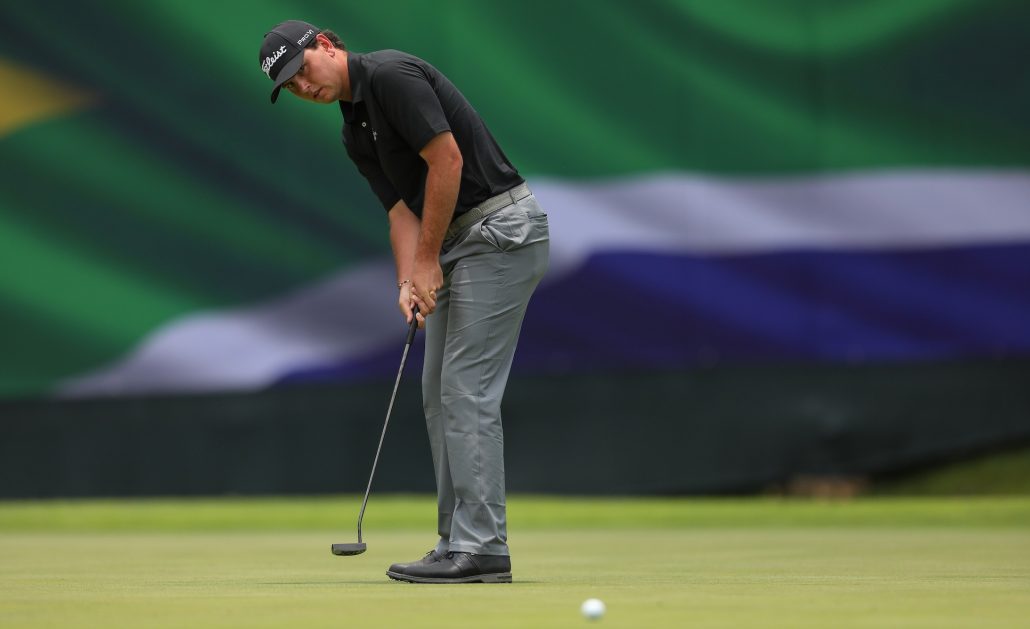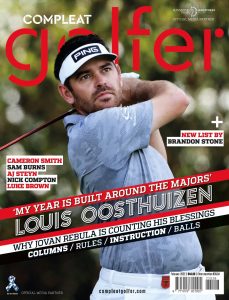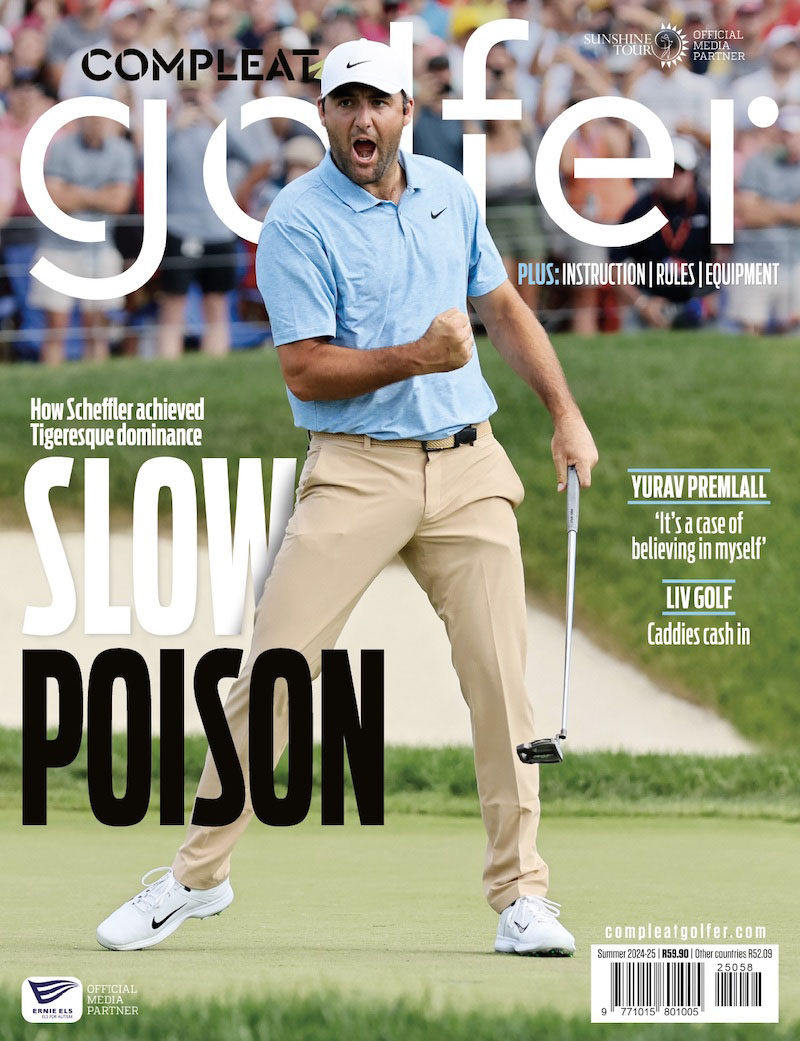The 2018 Amateur champion is now playing on the Sunshine Tour and believes everything happens for a reason, writes MICHAEL VLISMAS.
As Jovan Rebula climbs into his car, he begins to reflect on what should have been one of the best years of his life turning into one of the worst years of his life, and then turning into one of the biggest blessings of his life.
‘You know,’ he says, ‘it takes discipline to stay on your own path.’
And with this important realisation, Rebula says he is excited about what 2022 will bring as he embarks on his professional career on the Sunshine Tour.
But it’s a realisation he’s come to in the hardest way possible for a highly talented 24-year-old who had a stellar amateur career, highlighted by becoming, in 2018, only the second South African to win The Amateur Championship and a standout career at Auburn University.
So when in May 2021 Rebula decided to turn professional – in his own humble and quiet way – the sense was that this was the logical step for the next young star of South African golf.
He was two tournaments into his professional career on the Forme Tour and on his way to his third when that all changed quite quickly. Rebula had just driven six hours to Louisville, Kentucky, and when the car stopped, he struggled to climb out. When he finally did get out, he could barely walk.
He wasn’t able to swing a golf club until the end of 2021, and he also wasn’t able to play a full 18 holes of golf until he teed it up at last November’s Joburg Open on the Sunshine Tour.
Rebula had been diagnosed with a bulging disc and an acute case of sciatica. ‘When I climbed out of the car in Louisville, I felt a shooting pain down my left leg,’ he says.
‘I hadn’t been playing well at the time, but nobody really knew what lay behind it. I’ve always struggled with my back but could fix the problem short term. And then it just seemed to build up until it gave in. I really struggled to the point where I just couldn’t play golf. It was a bad time of my life and the first kind of major injury of my career.’
And as is so often the irony in golf, that’s when the revelation came.
‘I learned so much in this time that I wasn’t playing. It was almost a blessing in disguise. I wasn’t playing my best golf before the injury, and this gave me the time to sit down and rethink everything and come up with a new gameplan for myself. It was a great way to put together a good team around me.
‘I spoke to my uncle [Ernie Els] a lot. He phoned me often just to check in and see how things were going. At times I felt like he wanted me to get out of that situation even more than I did.
‘These conversations gave me the opportunity to ask him a lot of questions about how he created his team. It gave me a lot of perspective about who I want in my life and around my career. I’ve now got a team of people I know are willing to help me get to the PGA Tour, which is my ultimate goal.’
One of the people Rebula has included in this team – for the first time in his life – is a coach. More notably, David Leadbetter.
‘I’ve always been a guy who does everything by himself. I never had a coach besides my uncle, who would give me tips here and there. I was a bit wary of coaches because you hear all the stories of players having their swings changed and it affecting their games. But then I started working with David Leadbetter and it’s been absolutely fantastic.
‘The standard is so good out there, and everybody is chasing that 1% to get better. My game needed a bit more guidance to get that little bit better every day. My goal has been just that small improvement each day. What I like about David is he’s old school. He’s worked with my uncle for 20 years and he’s coached the greatest in the game. I like that old-school vibe. So I’ve opened up a bit more on the coaching side of things, and have let him guide me more.’
As for the injury, Rebula also has his plan for managing this. ‘A bulging disc takes a while to go away. It’s just a case of putting in the time with physio. I don’t leave my house before I’ve done my exercises. I know what I’m dealing with now and have all the knowledge and exercises to manage it. I’m about 90% there in terms of being where I want to be. There are times when I feel a bit limited, but then I spend the time in the gym and with physio. I know what I need to do to be comfortable for four rounds.’
There was no better indication of this self-awareness than his finish of tie-10th at last year’s South African Open at Sun City. To complete four full rounds on the demanding Gary Player Country Club course at only his second professional tournament since returning from his injury was a major confidence boost. Rebula will be seeking more of this on the Sunshine Tour.
‘When all this happened, I was sitting with my manager and we were trying to figure out the next move. At the time it all felt like a bit of a blur. And then the Sunshine Tour granted me invites to the Joburg Open and the South African Open, and I’m extremely grateful for that.
‘For me, it’s now a case of wherever I can play I’ll play. If I get a call for a tournament wherever in the world, I’ll pack my bags and climb on a plane. When you aren’t able to play golf, you realise how much you miss the game. You gain a lot of perspective. I love golf. It’s been a big part of my life and I’ve been dreaming about this next phase of my career. To finally be a pro is extremely exciting.’
The humility, optimism and appetite for hard work that Rebula brings to his career is refreshing. As the nephew of Ernie Els, it would be easy to fall back on this family status. But for every door that has opened for Rebula, he has taken every opportunity and worked his tail off in gratitude. More than anything, he has been a keen observer of how hard his famous uncle has worked – and continues to do – at his craft. And he has brought this same work ethic to his own game.
‘That’s my career summed up there. It’s all about taking the opportunities that come your way. I’ve been very blessed to get the opportunities I have. I was blessed to be around good people who wanted to help me. To play for the Golf RSA National Squad was a huge honour for me. They, with the support of Mr Johann Rupert, were willing to help me wherever they could and I am extremely grateful to them. The Ernie Els & Fancourt Foundation played an equally important role for my career. Hannes van Niekerk, the CEO, has been a mentor to me. I learned so much from him during my amateur career, and I’m very pleased with how my amateur career turned out.
‘Then college was also fantastic. That’s where my uncle got involved, he pushed me to go to college. I wanted to go straight to the pro ranks, but he advised me to try college first and to use it to grow as a person and learn how to be a man on my own. That’s where college helped me a lot – just that ability to learn about yourself and become an independent man.’
And it was at college where Rebula realised the value, and discipline, of staying on your own path in this game and not being sidetracked by what others around you are doing.
‘In college, I played my last NCAA National Championship with Collin Morikawa, and you realise again just how good players like him are when they get out on Tour and start winning. I played a ton of college golf with Viktor Hovland, Matt Wolff and Morikawa, and you see what it takes to be top 20 in the world. Knowing you played with them and could compete with them is a great confidence boost.
‘But I did get to the point in my college career where a lot of my friends were having so much success as professionals, and then you can’t help thinking that if they can do it, so can I.
‘I spoke to my uncle about that a lot. I learned that if you can shift the focus to yourself more and not so much to others and what they’re doing, that’s what it’s all about.
‘I took those four years in college and decided I was going to gain as much experience as I could. I decided not to put pressure on myself to follow anybody else’s path, but rather to learn as much as I could about the best way for me, and then to be able to use that in my professional career. Your true character develops once you’re on your own like that. I like a good challenge like that. My injury was a big challenge too and I was determined to learn what it taught me. It’s all about perspective.’
It is with this wisdom from setbacks and an excitement about what the future holds that Rebula will now embark on his Sunshine Tour career.
‘The Sunshine Tour is very competitive. There is no doubt the guys can play here. So many of the game’s greatest stars came through the Sunshine Tour. So this is my main focus for now. And I’m excited about what lies ahead.’
DID YOU KNOW?
Jovan Rebula became the first South African in more than half a century to break the curse of the Royals and win the 123rd Amateur Championship at Royal Aberdeen in June 2018.
Rebula sealed the double for Golf RSA when he defeated Irishman Robin Dawson in the 36-hole final, just four days after fellow Golf RSA National Squad player Wilco Nienaber became the first South African to take the Leading Amateur honour in the 36-hole strokeplay qualifier.
Before Rebula’s triumph, Bobby Cole was the only South African to claim the coveted Amateur Championship title, winning at Carnoustie in 1966, and since then South Africa has lost out in four subsequent finals.
The 20-year-old Rebula ended the winning drought when he beat Dawson 3 & 2 – the same winning margin that won Cole the coveted trophy at Carnoustie in 1966.
– This article first appeared in the February 2022 issue of Compleat Golfer magazine. Subscribe here!









